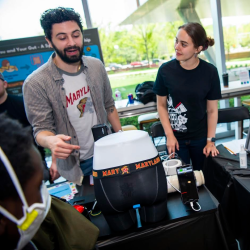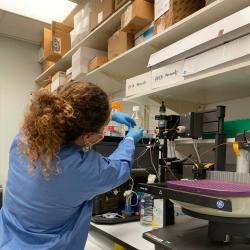College Boasts Four NIH Life Science Training Grants
The National Institutes of Health (NIH) recently awarded the University of Maryland’s College of Computer, Mathematical, and Natural Sciences a new Ruth L. Kirschstein National Research Service Award Institutional Research Training Grant (T32) in virology and renewed the college’s T32 training program in host-pathogen interactions (HPI) for another five years. The grants add to the college’s other long-running T32 grants focused on the comparative and evolutionary biology of hearing (CEBH) and cell and molecular biology (CMB).
These training grants provide competitive stipends, health insurance, travel funds and other forms of support for trainees. They are typically graduate students or postdoctoral fellows funded for one year, with the possibility of extensions.
“This gives us a mechanism other than teaching assistantships for supporting students’ research and allows us to place a lot of emphasis on supporting Ph.D. research at a time when it’s really critical that the students focus on their projects,” said Biology Professor Catherine Carr, co-principal investigator of the CEBH T32 grant that supports four graduate students and two postdocs.
The virology grant, led by Cell Biology and Molecular Genetics (CBMG) Professor Anne Simon, supports three graduate students and two postdocs. HPI supports four graduate students and is run by CBMG Professors Kevin McIver and David Mosser. Entomology Chair Leslie Pick directs the seven-year-old CMB training program, which supports six graduate students.
Trainees have published research findings in high-impact journals, including Science, the Proceedings of the National Academy of Sciences (PNAS) and PLOS Pathogens. They have also gone on to successful careers in academia, industry and health professions.
Sergey Sulima, Ph.D. ’13, molecular and cellular biology, who was supported by the CMB training grant from 2010 to 2012, published a first-author paper in PNAS on a role ribosomal mutations play in cancer. Currently a postdoctoral scientist at the VIB Center for the Biology of Disease in Belgium, Sulima also co-authored papers in the journals Nature, Blood and Nucleic Acids Research with CBMG Chair Jonathan Dinman.
See also:
- Fighting Human Disease at All Scales, from Multispecies to Submolecular: For many life scientists, staying ahead of the curve means engaging in an arms race against deadly diseases. Our Fall 2017 Odyssey magazine cover story.
- Disease-fighting Alumni: A sidebar highlighting alumni whose research aims to improve the lives pf people living with autoimmune diseases, HIV and breast cancer.
- A Tale of Two Bacteriology Alumnae: A sidebar about two women whose long and successful careers began with the degrees they earned at the University of Maryland in the 1930s and 1940s.
This article was published in the Fall 2017 issue of Odyssey magazine. To read other stories from that issue, please visit go.umd.edu/odyssey.







